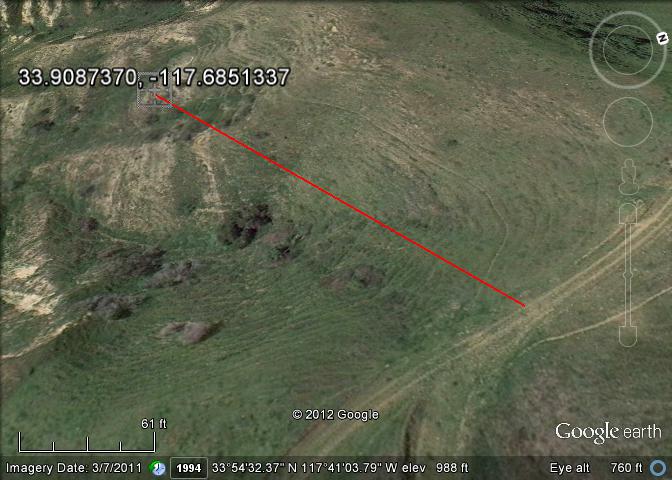Difference between revisions of "User:Scerruti"
imported>Scerruti m (→Leave No Trace: Typo) |
imported>Scerruti (added asg to get the categories) |
||
| (2 intermediate revisions by the same user not shown) | |||
| Line 1: | Line 1: | ||
| + | {{ASG|Y=1966|m=03|d=30|gender=m|lat=33|lon=-117}}Hello, and thank you for visiting my user page. I live in Oceanside, California which is is in the [[Santa Ana, California | Santa Ana]] graticule, but I also keep an eye on [[San Diego, California | San Diego]], [[Tecate, Mexico]] and [[Borrego Springs, California | Borrego Springs]]. I am currently involved with my sons in Scouting and that association has rekindled my interest in getting outdoors more often. I am much more interested in going to hashes that are in hikable areas than ones in urban areas, however keeping to the principles of Leave No Trace often leaves me unable to complete otherwise reachable coordinates. I like to drag along my sons whom I affectionately refer to as A' and D* (which annoys the bots). | ||
| + | |||
| + | == Current Goals == | ||
| + | *Work on establishing a culture of Saturday meetups in San Diego by encouraging geohashing | ||
| + | *San Diego County [[Regional geohashing achievement]] (need Borrego-Springs graticule) | ||
| + | *Santa Ana graticule [[Water geohash]] (need boat) | ||
| + | *Santa Ana graticule [[Reverse regional achievement]] (need Orange County) | ||
| + | *[[Puppet Master Geohash]] in [[Richmond, Virginia]] or at [[Blacksburg, Virginia | Virginia Tech]] (see my notification list: [[User:Scerruti/Notifications]]) | ||
| + | |||
| + | == My Favorites == | ||
| + | [[File:2012-04-22 33 -117.jpg | 200px | right | Favorite Picture]] | ||
| + | *Near Miss [[2010-10-15_33_-118]] | ||
| + | *Coordinates Reached [[2012-04-26_33_-117]] | ||
| + | *Achievement [[2012-02-03_32_-116]] ([[Virgin Graticule]]) | ||
| + | <br style="clear: both" /> | ||
| + | == Expeditions == | ||
| + | [[User:scerruti/Expeditions | My Spontaneous Adventures]] | ||
| + | |||
| + | == Cub Scout Academic and Sports Program (aka Belt Loops) == | ||
| + | I have created a mapping of [[User:scerruti/CubScouts | belt loops]] that Cub Scouts can earn while geohashing to corresponding geohashing achievements. | ||
| + | |||
== Leave No Trace == | == Leave No Trace == | ||
| − | |||
Let's face it, I live in a tough area to geohash. Between the ocean, Mexico and the high population density in most of the local graticules it can be a real struggle to find accessible meet up locations. Today for instance would be a perfect day to go for the Santa Ana (33, -117) graticule. However the point falls within Chino Hills State Park. There is a trail that runs to within 100m of the point, this trail can definitely be accessed from within the park ($5 day use fee) but may also be able to be accessed from a fire road outside the park. Here's the rub, I follow the principles of Leave No Trace. That means when I am in the frontcountry, which Chino Hills SP certainly is, I will not leave the trail. The best I could do is get within viewing distance of the point. | Let's face it, I live in a tough area to geohash. Between the ocean, Mexico and the high population density in most of the local graticules it can be a real struggle to find accessible meet up locations. Today for instance would be a perfect day to go for the Santa Ana (33, -117) graticule. However the point falls within Chino Hills State Park. There is a trail that runs to within 100m of the point, this trail can definitely be accessed from within the park ($5 day use fee) but may also be able to be accessed from a fire road outside the park. Here's the rub, I follow the principles of Leave No Trace. That means when I am in the frontcountry, which Chino Hills SP certainly is, I will not leave the trail. The best I could do is get within viewing distance of the point. | ||
[[File:2012-05-08 33 -117 LeaveNoTrace.jpg | center | Distance from trail to hashpoint]] | [[File:2012-05-08 33 -117 LeaveNoTrace.jpg | center | Distance from trail to hashpoint]] | ||
| Line 15: | Line 35: | ||
'''This is for frontcountry, what about backcountry?''' | '''This is for frontcountry, what about backcountry?''' | ||
| − | In general it is permissible to travel | + | In general it is permissible to travel backcountry off trail. This is because there will be fewer people in the backcountry and therefore less possibility of permanent damage. Additionally there may not be existing trails in many areas. However when leaving the trail to travel to a backcountry hashpoint members of the expedition should be careful to take divergent paths so as to prevent one area of vegetation from being trampled. |
| − | While much of the Anza-Borrego Desert State Park is backcountry, this backcountry rule may not apply there. In many areas of the desert the ground is so sensitive that footprints and tracks impact the area for decades. | + | While much of the Anza-Borrego Desert State Park is backcountry, this backcountry rule may not apply there. In many areas of the desert the ground is so sensitive that footprints and tracks impact the area for decades. This is especially true for dry lake beds. |
Latest revision as of 06:42, 1 July 2013
Hello, and thank you for visiting my user page. I live in Oceanside, California which is is in the Santa Ana graticule, but I also keep an eye on San Diego, Tecate, Mexico and Borrego Springs. I am currently involved with my sons in Scouting and that association has rekindled my interest in getting outdoors more often. I am much more interested in going to hashes that are in hikable areas than ones in urban areas, however keeping to the principles of Leave No Trace often leaves me unable to complete otherwise reachable coordinates. I like to drag along my sons whom I affectionately refer to as A' and D* (which annoys the bots).
Contents
Current Goals
- Work on establishing a culture of Saturday meetups in San Diego by encouraging geohashing
- San Diego County Regional geohashing achievement (need Borrego-Springs graticule)
- Santa Ana graticule Water geohash (need boat)
- Santa Ana graticule Reverse regional achievement (need Orange County)
- Puppet Master Geohash in Richmond, Virginia or at Virginia Tech (see my notification list: User:Scerruti/Notifications)
My Favorites
- Near Miss 2010-10-15_33_-118
- Coordinates Reached 2012-04-26_33_-117
- Achievement 2012-02-03_32_-116 (Virgin Graticule)
Expeditions
Cub Scout Academic and Sports Program (aka Belt Loops)
I have created a mapping of belt loops that Cub Scouts can earn while geohashing to corresponding geohashing achievements.
Leave No Trace
Let's face it, I live in a tough area to geohash. Between the ocean, Mexico and the high population density in most of the local graticules it can be a real struggle to find accessible meet up locations. Today for instance would be a perfect day to go for the Santa Ana (33, -117) graticule. However the point falls within Chino Hills State Park. There is a trail that runs to within 100m of the point, this trail can definitely be accessed from within the park ($5 day use fee) but may also be able to be accessed from a fire road outside the park. Here's the rub, I follow the principles of Leave No Trace. That means when I am in the frontcountry, which Chino Hills SP certainly is, I will not leave the trail. The best I could do is get within viewing distance of the point.
What harm would come from briefly leaving the trail to reach the hashpoint?
These two resources provide in depth information, but is it sufficient to say that staying on the trail preserves our natural resources for future generations.
California State Park's Stay on the Trail Brochure
Leave No Trace Center for Outdoor Ethics
This is for frontcountry, what about backcountry?
In general it is permissible to travel backcountry off trail. This is because there will be fewer people in the backcountry and therefore less possibility of permanent damage. Additionally there may not be existing trails in many areas. However when leaving the trail to travel to a backcountry hashpoint members of the expedition should be careful to take divergent paths so as to prevent one area of vegetation from being trampled.
While much of the Anza-Borrego Desert State Park is backcountry, this backcountry rule may not apply there. In many areas of the desert the ground is so sensitive that footprints and tracks impact the area for decades. This is especially true for dry lake beds.

